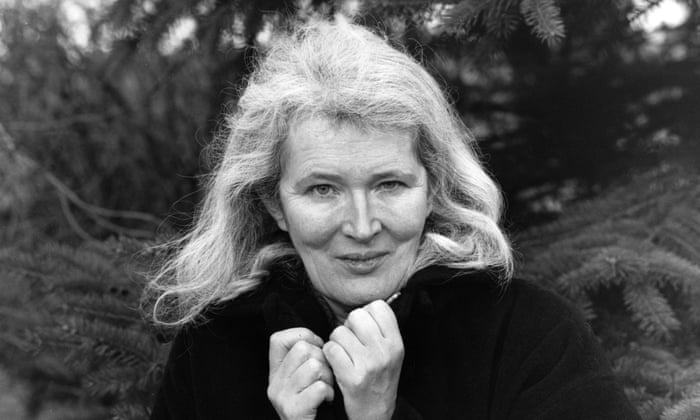 |
| Angela Carter |
A book
that changed
me
Angela Carter's exploration of life in a female body taught me to be comfortable in my own
I was 15 and in the bottom set for most subjects at school. The Magic Toyshop changed everything
Evie Wyld
Monday 8 June 2020
T
he Magic Toyshop by Angela Carter was the first book I read at school that seemed to make some kind sense of my life. I was 15, and in the bottom set for every class other than art, where I painted very badly and was praised a disproportionate amount for my terrible, angsty self-portraits; in most of which I appeared bald for some reason.
As the weakest student of every bottom set – quite an accomplishment – I couldn’t spell and my handwriting bordered on illegible. From my point of view, there was a great worthiness about most of the books we studied, a dusty maleness, and it felt like there was nothing so important as a man of about 57 who was very wise and sure of himself.
Reading the first page of The Magic Toyshop was revelatory. My bad, bald self-portraits began to make sense. I was trying on other skins, attempting to fit comfortably into my own. The story’s protagonist, Melanie, discovers her own body at the age of 15 in a way that completely scandalised our English class – I remember one girl teasing another, asking if she’d ever looked at herself naked in the mirror – an impossible thing to answer without complete ridicule and mortification.
And there was Melanie, setting herself up, between masturbating, to look like Lautrec’s models, “legs apart with a basin of water on the floor”. I remember how outrageous it felt to read about a young woman looking at her own body in a mirror, admiring it. The next thing Melanie did was put into words the dreadful feeling of being assessed by a man – the first few times it happens and you have nothing to compare it to: how magnetic it feels, and how dangerous.
“It was as if he had put on the quality of maleness, like a flamboyant cloak. He was a tawny lion poised for the kill – and was she the prey? She remembered the lover made up out of books and poems she had dreamed of all summer; he crumpled like the paper he was made of before this insolent offhand terrifying maleness, filling the room with its reek. She hated it but could not take her eyes off him.”
What a relief when her younger siblings are taken away from Melanie and she is freed of the responsibilities of being “a little mother”.
Alongside the bad portraits, I’d been writing short stories by then for a couple of years, about hideously fantastical things – people who lived inside their own minds under bridges because that was more beautiful than reality, or the setting of one’s self on fire, because of a general sense of ennui and the batteries in one’s Walkman running out. I still have the little booklet of stories I made back then. The writing is desperate to seem serious, to seem huge and wise like the old men we read at school.
It is often the magical, fabular aspects of Carter’s stories that people focus on, but in The Magic Toyshop I responded to the way she blended this with a clear-eyed realism about what it was to live in a female body. Carter seemed to be saying something about female experience, that it had a different kind of relationship to reality than those breezy male characters I had previously met, confident in their role as subject and point of view. Melanie becomes aware of her body and sexuality as part of a process of literal discovery in which she compares it to America. Rereading this book, I am struck by this metaphor, the female body as colonised land, site of projected meaning, violence and plunder.
In a novel so brilliantly conjured from splayed toothbrush heads, mustard-and-cress sandwiches and prawn shells, bread loaves and cutlery, brickwork and yellow household soap, the female body is both one more familiar object and at the same time something strange and troubling. Melanie is only able to understand her body by turning it into another kind of object, but in doing so she understands this is a power. As a young girl experiencing that moment when your body is both the vessel for your self but suddenly, as if overnight, also a thing, a collection of objects for men to look at, assess, interpret and desire, Carter’s story seemed to speak directly to my life. That this was an experience from which art could be made felt like someone had opened a door somewhere.
My English teacher, sensing a student pricking up her ears for the first time, took me one Saturday to hear Carmen Callil, Carter’s best friend and editor, talk. She told us that “Angie” couldn’t spell. That was perhaps the most encouraging thing I’d heard from anybody, that the gridlines of schoolwork didn’t mark the limits of ability. In her introduction to the 1981 edition, Callil writes that “all over the world are literary incendiary bombs planted by Angela, and in Britain, young writers whom she encouraged”.
Encouraged is an interesting word that has become gentler in the way it is commonly used. But Callil was no doubt using it in the literal sense, of Carter giving writers the courage to write. I know that had I not read The Magic Toyshop at that point in my life, I would never have felt that my sort of experiences deserved to be written about at all.
- Evie Wyld is a writer and the author of After the Fire, A Still Small Voice; All the Birds, Singing; and Everything is Teeth. Her most recent book is The Bass Rock


No comments:
Post a Comment